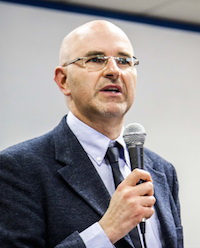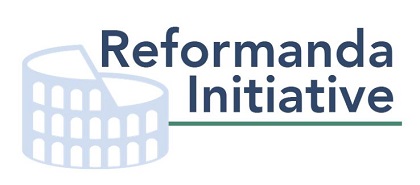Why are so many evangelical Christians worried about the growing unity between Protestants and Roman Catholics? We ask Leonardo De Chirico, one of the theologians behind the “Is the Reformation Over?” document.

One week before Reformation Day, a document was issued stating that the “The Reformation is not over”. The manifesto is supported by more than fifty representative evangelical Christians: theologians, leaders of denominations and international ministries, as well as leaders of Bible seminaries and national Evangelical Alliances. Why?
Evangelical Christians believe that the final authority is the Bible and that one is saved through faith alone.
“The document reaffirms that on these two issues the Reformers were simply recovering the biblical gospel, and therefore so should we”, says Leonardo De Chirico, Director of the Reformanda Initiative, the group that has propelled the document.
Evangelical Focus asked De Chirico about the reasons that led to publish such a statement.
 Leonardo De Chirico.
Leonardo De Chirico. Question. Why do the signatories of “Is the Reformation Over?” document feel the need to express that the Reformation is not over? What has led you to write a statement like this?
A. In 2005 an insightful book by Mark Noll and Carolyn Nystrom asked the question: Is the Reformation over? And there has been much discussion since.
Approaching the 500th anniversary many in the evangelical movement felt the need to give a clear and univocal answer: in its main biblical concerns, the Reformation is as true and relevant as ever. The document clearly does that.
Q. Some could say evangelical churches should not tell other Protestant churches that working for “unity” and “reconciliation” with the Roman Catholic Church is wrong. What would you respond?
A. The document recognizes the value of respectful and friendly dialogue and even cooperation with the Roman Catholic Church. Having said that, the Reformation was mainly about the recovery of the authority of Scripture and the biblical gospel of salvation by faith alone.
On these two pillars of the Christian faith the differences with the Roman Catholic Church are still fundamental. Thinking of unity we cannot fudge these two pivotal points. I think the document pays tribute to Christian unity by pointing to the need of having biblical criteria for it.
Q. It is often heard that believers who do not support ecumenism are “angry Christians”, anchored in the past. Is this an “angry” statement?
A. I would say that it is a statement characterized by a biblical “parrhesia”, i.e. the bold conviction deriving from being persuaded by the gospel truth which, after all, was recovered at the Reformation.
After suggesting what was at stake at the Reformation and why it is still relevant, the last section of the document “looks ahead” towards better clarification and cooperation on the basis of the gospel, not as part of a self-referential desire for unity. A few years ago, evangelical theologian David Wells wrote a book entitled The courage to be protestant. This is a courageously protestant statement!
Q. “In our global world, we encourage cooperation between Evangelicals and Catholics in areas of common concern, such as the protection of life and the promotion of religious freedom”, the document says. But when it comes to “fulfilling the missionary task of proclaiming and living out the gospel of Jesus Christ to the whole world, Evangelicals must be careful to maintain clear gospel standards when forming common platforms and coalitions”. What is the difference between these two fields of action?
A. The gospel compels us to be willing to cooperate with people of all sorts of religious and ideological backgrounds on a variety of issues related to the dignity of the person and towards implementing fair practices in society.
Evangelism and mission, however, require an agreement on the foundational truths of the gospel and therefore can be done only with Bible-believing and born again Christians. In recent times, the evangelical apologist Francis Schaeffer (1912-1984) drew a distinction between “co-belligerence” in society among people who converge on a certain topic, and “alliance” in evangelism amongst born again Christians.
Q. The document also says: “Evangelicals affirm, with the Reformers, the foundational convictions that our final authority is the Bible and that we are saved through faith alone”. Do you believe some Protestants have abandoned these two basic beliefs?
A. The document is a positive affirmation of the two main tenets of the Reformation. The 500th anniversary is a welcomed opportunity to celebrate the biblical gospel by upholding these two pillars of the Christian faith.
It cannot be denied that they have been both significantly restated and re-interpreted in much modern and contemporary theology, both in liberal Protestant and Roman Catholic camps. The document reaffirms that on these two issues the Reformers were simply recovering the biblical gospel, and therefore so should we.
Q. Many evangelical Christians will celebrate the Reformation. How do you think Martin Luther would see the way the start of the Reformation is commemorated in 2017 in ecumenical circles?
A. Luther would elevate the gospel above any other concern. Anything that does not hold the gospel as central is easily persuaded by the political correctness of the ecumenical diplomacy of our time.
Q. Finally, who have signed the statement? From what context do they come from?
A. The signatories represent various segments of the evangelical movement. We are the tip of an iceberg that expresses the evangelical commitment to the gospel as well as the commitment to uphold the tenets of the Reformation in our global world.
 The Reformanda Initiative.
The Reformanda Initiative. Read the document “Is the Reformation Over? A Statement of Evangelical Convictions” in English, Italian, Slovakian and Spanish.
For more information about the initiative, visit the “Is the Reformation over?” website.

Las opiniones vertidas por nuestros colaboradores se realizan a nivel personal, pudiendo coincidir o no con la postura de la dirección de Protestante Digital.
Si quieres comentar o